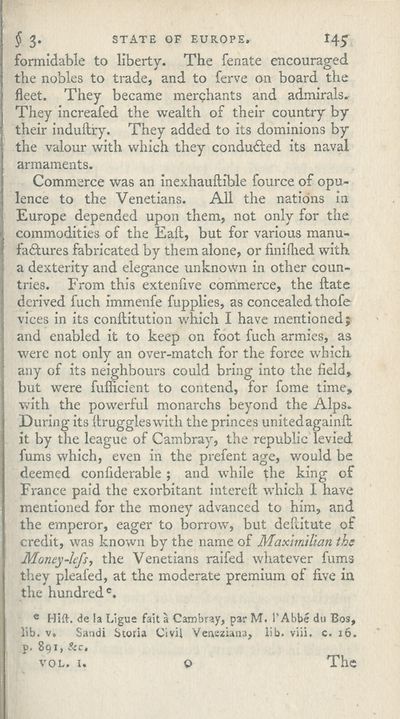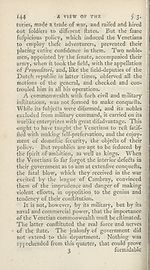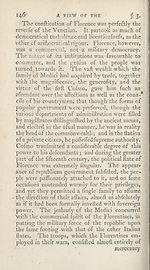Download files
Complete book:
Individual page:
Thumbnail gallery: Grid view | List view

§ 3. STATE OF EUROPE. I4£
formidable to liberty. The fenate encouraged
the nobles to trade, and to ferve on board the
fleet. They became merchants and admirals.
They increafed the wealth of their country by
their induftry. They added to its dominions by
the valour with which they conducted its naval
armaments.
Commerce was an inexhauftible fource of opu¬
lence to the Venetians. All the nations in
Europe depended upon them, not only for the
commodities of the Eall, but for various manu-
faftures fabricated by them alone, or fmiflred with
a dexterity and elegance unknown in other coun¬
tries. From this extenfive commerce, the ftate
derived fuch immenfe fupplies, as concealed thofe
vices in its conftitution which I have mentioned j
and enabled it to keep on foot fuch armies, as
were not only an over-match for the force which
any of its neighbours could bring into the field,
but were fufficient to contend, for fome time,
with the powerful monarchs beyond the Alps.
During its llruggleswith the princes unitedagainfl:
it by the league of Cambray, the republic levied
fums which, even in the prefent age, would be
deemed confiderable ; and while the king of
France paid the exorbitant intereft which I have
mentioned for the money advanced to him, and
the emperor, eager to borrow, but dehitute of
credit, was known by the name of Maximilian thg
Money-left, the Venetians raifed whatever fums
they pleafed, at the moderate premium of five in
the hundred'.
* Hift. de la Ligue fait a Cambray, par M. 1’Abbe du Bos,
lib. v. Saadi Storia Civil Veneziaiia, lib. viii. c. 16.
p. 891, tic.
VOL. I.
O
The
formidable to liberty. The fenate encouraged
the nobles to trade, and to ferve on board the
fleet. They became merchants and admirals.
They increafed the wealth of their country by
their induftry. They added to its dominions by
the valour with which they conducted its naval
armaments.
Commerce was an inexhauftible fource of opu¬
lence to the Venetians. All the nations in
Europe depended upon them, not only for the
commodities of the Eall, but for various manu-
faftures fabricated by them alone, or fmiflred with
a dexterity and elegance unknown in other coun¬
tries. From this extenfive commerce, the ftate
derived fuch immenfe fupplies, as concealed thofe
vices in its conftitution which I have mentioned j
and enabled it to keep on foot fuch armies, as
were not only an over-match for the force which
any of its neighbours could bring into the field,
but were fufficient to contend, for fome time,
with the powerful monarchs beyond the Alps.
During its llruggleswith the princes unitedagainfl:
it by the league of Cambray, the republic levied
fums which, even in the prefent age, would be
deemed confiderable ; and while the king of
France paid the exorbitant intereft which I have
mentioned for the money advanced to him, and
the emperor, eager to borrow, but dehitute of
credit, was known by the name of Maximilian thg
Money-left, the Venetians raifed whatever fums
they pleafed, at the moderate premium of five in
the hundred'.
* Hift. de la Ligue fait a Cambray, par M. 1’Abbe du Bos,
lib. v. Saadi Storia Civil Veneziaiia, lib. viii. c. 16.
p. 891, tic.
VOL. I.
O
The
Set display mode to:
![]() Universal Viewer |
Universal Viewer | ![]() Mirador |
Large image | Transcription
Mirador |
Large image | Transcription
| Antiquarian books of Scotland > Kings & rulers > History of the reign of the Emperor Charles V. > Volume 1 > (163) |
|---|
| Permanent URL | https://digital.nls.uk/109184287 |
|---|
| Description | By William Robertson. London : Cadell and Davies, 1798. |
|---|---|
| Shelfmark | ABS.1.76.13 |
| Additional NLS resources: | |
| Description | Thousands of printed books from the Antiquarian Books of Scotland collection which dates from 1641 to the 1980s. The collection consists of 14,800 books which were published in Scotland or have a Scottish connection, e.g. through the author, printer or owner. Subjects covered include sport, education, diseases, adventure, occupations, Jacobites, politics and religion. Among the 29 languages represented are English, Gaelic, Italian, French, Russian and Swedish. |
|---|

